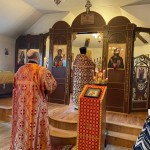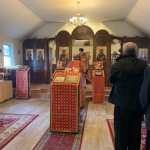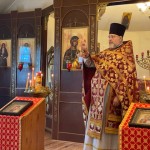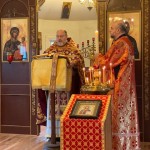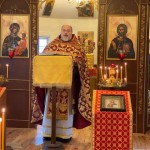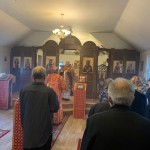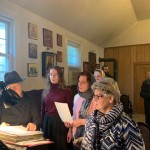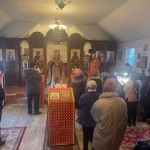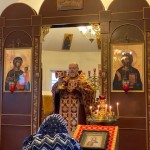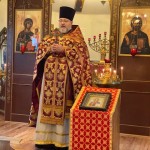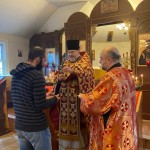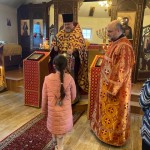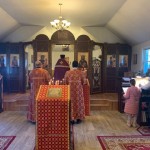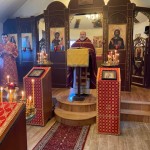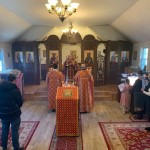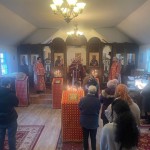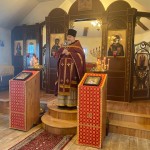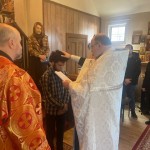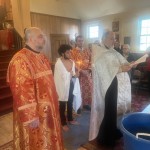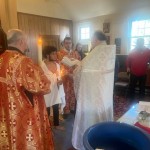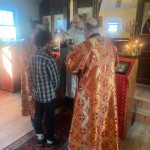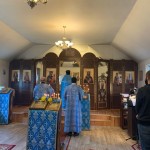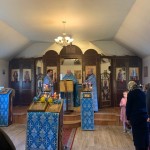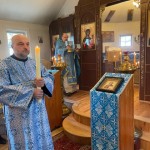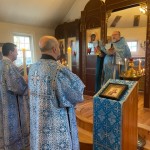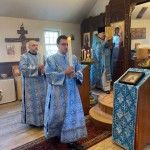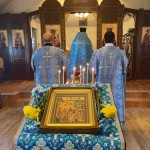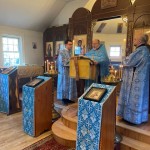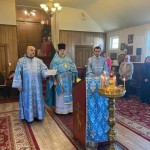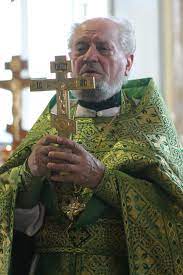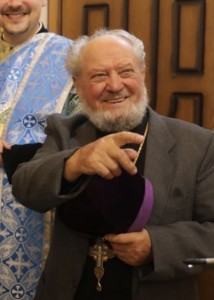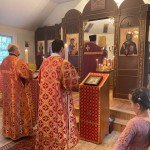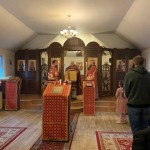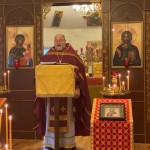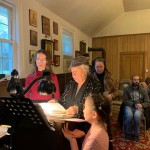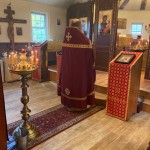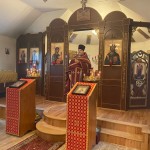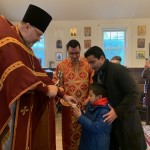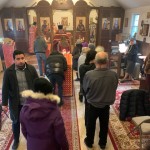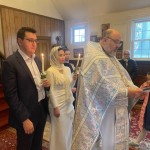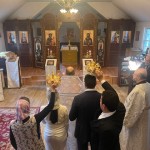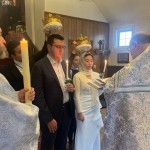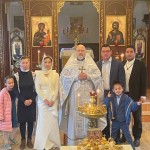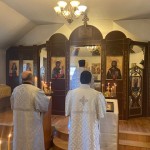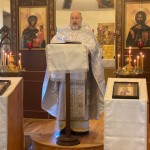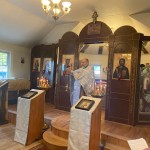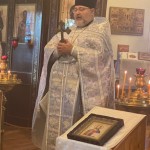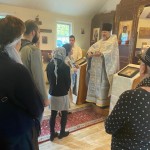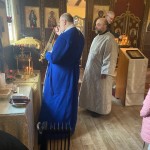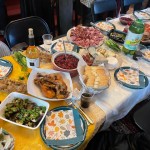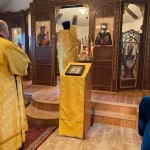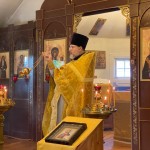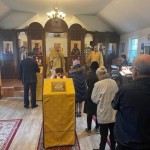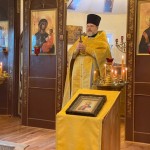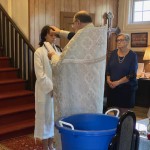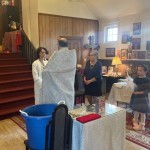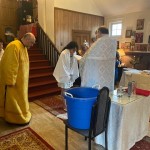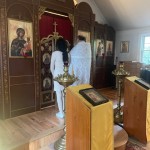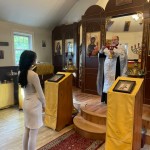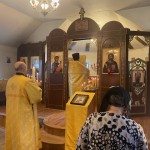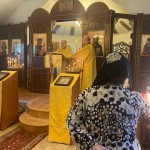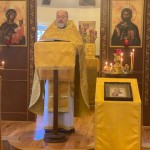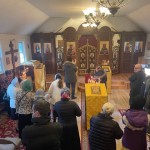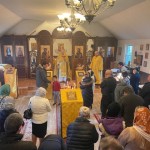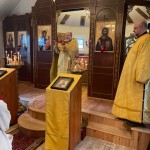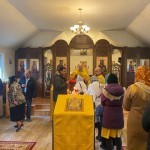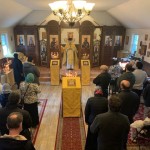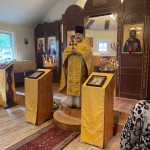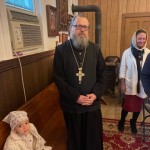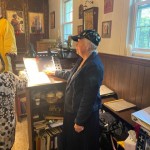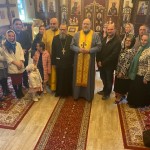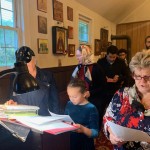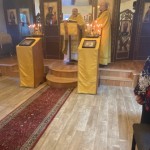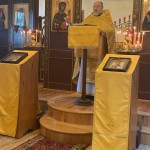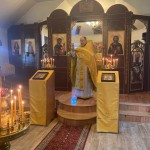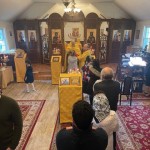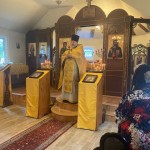On December 19, on the 26th Sunday after Pentecost, feast of St. Nicholas the Wonderworker, St. George Parish family gathered for a beautiful celebration. Our Rector, Archpriest Igor Tarasov headed the Divine Liturgy in our temple. After the Gospel lesson he preached the following homily:
“Dear brothers and sisters in Christ! Today we celebrate 26th Sunday after Pentecost, as well as feast of the Holy Father Nicholas the Wonderworker”.
“Our first Gospel reading is about gratefulness. Among the ten lepers cured by our Lord Jesus Christ, only one came back to the Savior to give Him thanks (Lk. 17, 12-19). The other nine people healed from a terrible disease did not return to show their appreciation”.
“That story makes us wonder how corrupt and bad our human nature is. And we are not really surprised by what happened in the Gospel reading. We know from our life experience that such things happen. Our lack of being grateful takes place when we do not really appreciate good things that we have. We do not appreciate God’s blessings. Or we take them for granted. Celebrating St. Nicholas day, we may recall that in many Orthodox countries children are expecting presents from St. Nicholas. And the parents before that day keep telling their kids that they should be nice, obedient and kind, otherwise St. Nicholas won’t bring them presents. But what usually happens is that children get their presents anyway. And such children learn that no matter how good or bad you may be, St. Nicholas will bring you something anyway. So, such a little thing may teach us from our childhood that good things come easily”.
“How can we change that wrong attitude when we either do not appreciate God’s blessings in our life or take them for granted? We can change it by keeping in mind that all good things we have are from the merciful Lord. And He distributes those things through different circumstances of our life and through different people in our life. We need to use our mind to understand that. Usually in religious life we prefer to use our faith and our heart. In this case we need our mind to help us to understand and appreciate the divine care and God’s grace. Therefore, let us attempt to use it”.
“Let us think of those ten lepers. We should imagine how miserable and horrible their life was. Leprosy is a terrible disease, causing your flesh to decay while you still alive. But in addition to physical sufferings, the lepers, especially in those times of Christ, had to suffer the alienation from the society. They were the outcasts, they were considered unclean and could not approach the people. This is why, as the Gospel mentions, they stayed afar off (Lk. 17, 12). Now Jesus healed them from that illness and cleansed them from their impurity. Their life changed completely, from being miserable to being at least normal. And yet most of them did not give thanks. Was it a right attitude? Of course, not”.
“Using our mind we may also imagine the opposite situation. Someone is feeling good but suddenly gets sick or something bad happens. How do most of us react? We begin to be disappointed or even angry. Often become angry even with God”.
“Dear brothers and sisters, when we feel disappointed by some things, let us again recall those ten lepers. Let us recall other people who suffer from terrible diseases, who are in great pain, who are dying or suffering all their lives! There are many such people all around us. Let us remember about that. And maybe then our mind will tell us that we are in a much better situation. And maybe then we will begin to appreciate the great blessings of the Lord bestowed upon us, who are unworthy”.
“Consider the case of the 3 military generals in the life of St. Nicholas whom we honor today. They were wrongfully accused and sentenced to death. How miserable and desperate they had to feel! But they prayed the Lord to save them through the intercession of St. Nicholas. And he appeared in a dream to the Emperor and defended those generals. As a result, the Emperor reviewed their case and found them not guilty”.
“Consider the father of the 3 daughters who was very poor and could not arrange for their marriages. That man was so desperate that he planned to force his daughters to become harlots. But St. Nicholas learned about that family and left a sac with money in their hut. He was doing it 3 times, so all the 3 daughters could be married”.
“In both instances people were miserable but through the grace of God and by the good works of the Lord’s Saint were made happy. Did they give thanks? At least, the father of the 3 daughters did. The life of St. Nicholas tells us that the man saw the Saint secretly leaving the money for the third time and he followed the benefactor. He caught him up and fell on his knees thanking him”.
“Dear brothers and sisters! Let us use our mind, let us think and learn that we have to be grateful to the Lord for everything. First of all, our Lord deserves our thanks just for the fact that we live. And everything good we have in that life is His generous gift. Since now, before Christmas or on St. Nicholas day, is time of presents, let us remember that the most important present from God is our own life. Let us avoid the wrong attitude of the ungrateful people like the 9 out of those 10 lepers. Let us also not fall in anger or bitterness when we encounter misery or different disappointing things in our life. Let us remember that very often our problems are much lesser than sorrows of some other people. Let us ask the Lord through the prayers of His great Saint, Holy Wonderworker Nicholas to make us mindful, strong and faithful and make us learn to appreciate divine blessings and to be truly grateful for them!”
During the Litany of Fervent Supplication, Fr. Igor proclaimed a petition beseeching the Lord to spare the faithful from the outbreak of the disease, as well as a petition of thanksgiving requested by Malyshev family.
During preparation for Holy Communion the choir prayerfully performed the magnification of St. Nicholas and pre-Nativity hymns from the Christmas canon.
After the dismissal of the Liturgy the Rector greeted our Sacristan and altar server, Andrew Malyshev on the occasion of his past name day and our guest Nicholas on his celebrated name day. Traditional Polychronion (“Mnogaia leta!”) was proclaimed and the Theotokian prosphora divided among those two persons. Then Fr. Igor handed the presents from St. Nicholas to the parish children.

